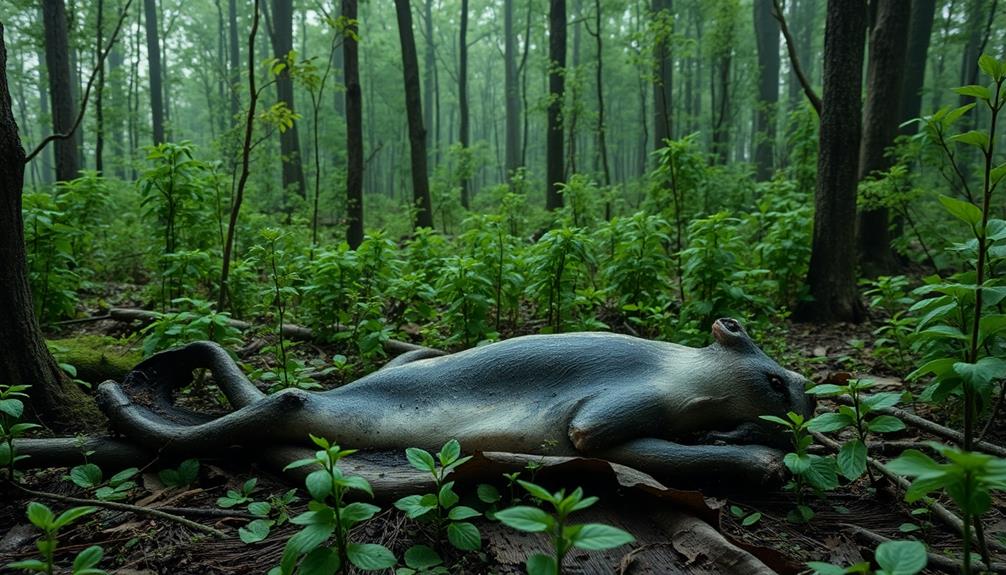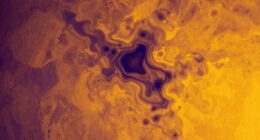When you come across a dead animal, you'll notice it smells really bad! This strong odor comes from gases released as the body decomposes. Think of it as a musty, rancid smell that gets worse over time. You might even see flies and maggots nearby, which are signs of decomposition. The smell can become super intense, especially in warm and damp places. You definitely want to take quick action if you find one to keep the area fresh! Curious about the different types of smells and what to do next? Stick around, and you'll discover even more interesting facts!
Key Takeaways
- The smell of a dead animal is strong, musty, and rancid, resulting from gases released during decomposition.
- Flies and maggots are common indicators, signaling active decomposition nearby.
- Environmental factors like warmth and humidity can intensify and prolong the odor.
- The presence of the smell may pose health risks due to bacteria, requiring protective gear for removal.
- Prompt action is essential to address the smell and ensure a fresher environment.
Introduction
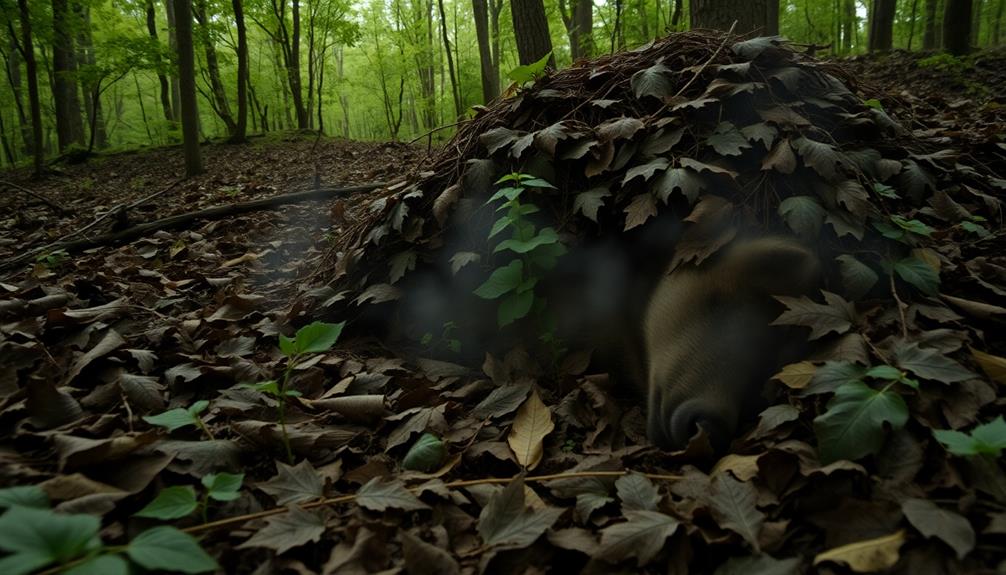
When you encounter the smell of a dead animal, it can be both alarming and unsettling. This strong odor often hits you like a wave, making you wrinkle your nose. The dead animal smell usually comes from a decomposing body, where bacteria break down soft tissues.
As time passes, this odor becomes more intense, mixing with other household smells at first, but soon it stands out on its own. You might notice that the smell gets even stronger if you're close to the carcass. The gases released during decomposition, like sulfur dioxide and methane, create that rancid, musty scent.
If the animal is in a damp area, the odor can linger much longer, making it harder to ignore. It's important to act quickly. You'll want to find and remove the carcass as soon as possible.
Different animals, like rodents, can leave behind this unpleasant smell, and the size of the animal can make a big difference too. Remember, the sooner you deal with it, the better. Your space will feel fresher, and you can breathe easy again!
Description of the Smell
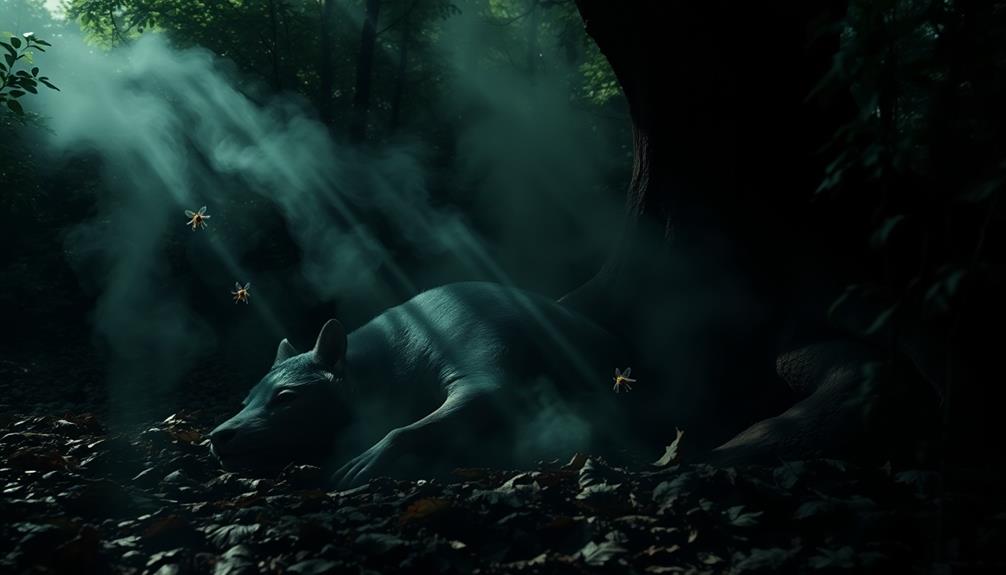
You'll usually notice that flies and maggots are nearby, too. Their presence signals that decomposition is actively happening, which only adds to the foul odor that fills the environment. The smell can be so overwhelming!
Environmental factors play a big role in how long the odor sticks around. For instance, if it's humid or warm, the dead animal smell can linger longer, making it even harder to escape.
If you're in a damp area, the scent might stick around until everything dries up or decomposes completely. So, next time you catch a whiff, you'll know just what's happening!
Source and Composition
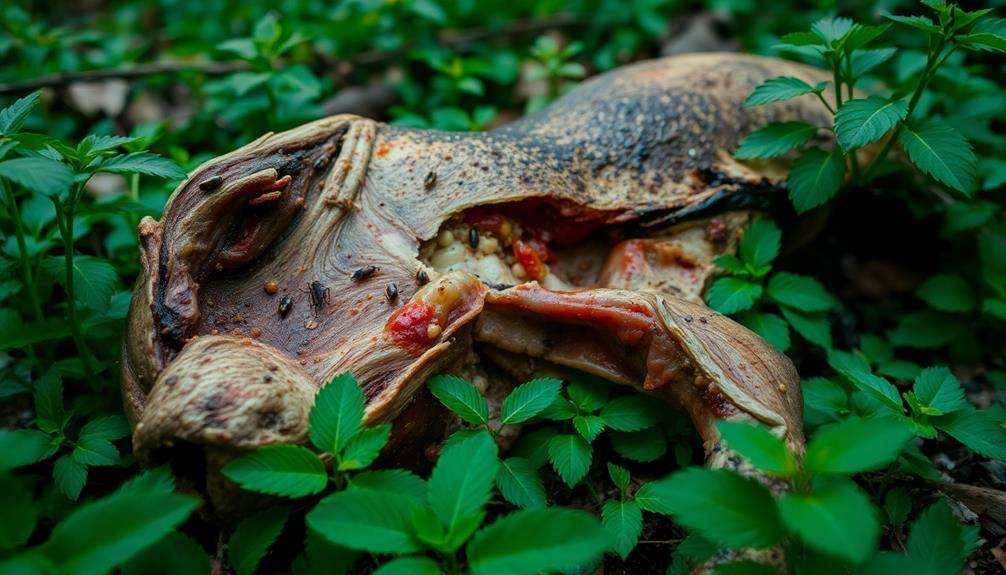
Often, the source of the smell from a dead animal stems from the gases released during decomposition. As the body breaks down, bacteria start munching on soft tissues. This process produces some pretty nasty compounds. You might notice smells like sulfur dioxide and other foul odors, such as hydrogen sulfide.
These gases create a strong, musty, and rancid odor that can remind you of rotting flesh.
As decomposition continues, the smell gets more intense and distinct. It's like a mystery! Each dead animal has its own unique odor profile.
The environment also plays a big role. Warmer temperatures and high humidity can speed up the decomposition process, making the smell even stronger.
Typical Scenarios or Environments
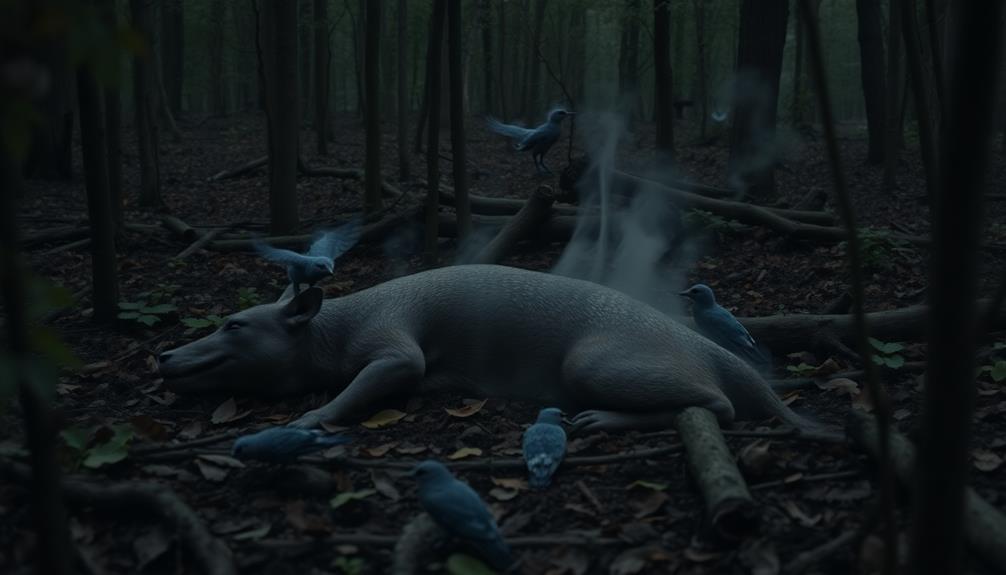
Dead animals can turn up in various scenarios, each contributing to the intensity of their pungent odor. You might find a dead animal inside your home, like dead mice hiding in attics or basements. In these enclosed spaces, the smell can get trapped and become even stronger, especially when it's warm outside.
Outside, areas near garbage bins or compost piles can initially mask the smell of a dead animal, but as time goes on, that rancid odor will make its presence known. If you're in your yard or garden, you might notice a blend of natural scents at first. However, the distinct smell of decay will eventually overpower everything else. As the days pass, the odor intensifies, becoming nearly impossible to ignore. While the rancid stench of decomposing animal matter is unmistakable, some have compared its strength to the sharp, chemical-like smell of a meth lab. In both cases, the overwhelming scent signifies a toxic environment that no one should venture too close to.
You may also spot flies and maggots nearby, which are usually signs of a dead animal. These pesky insects are attracted to decomposing flesh and can make the smell even more noticeable.
Emotional or Cultural Associations
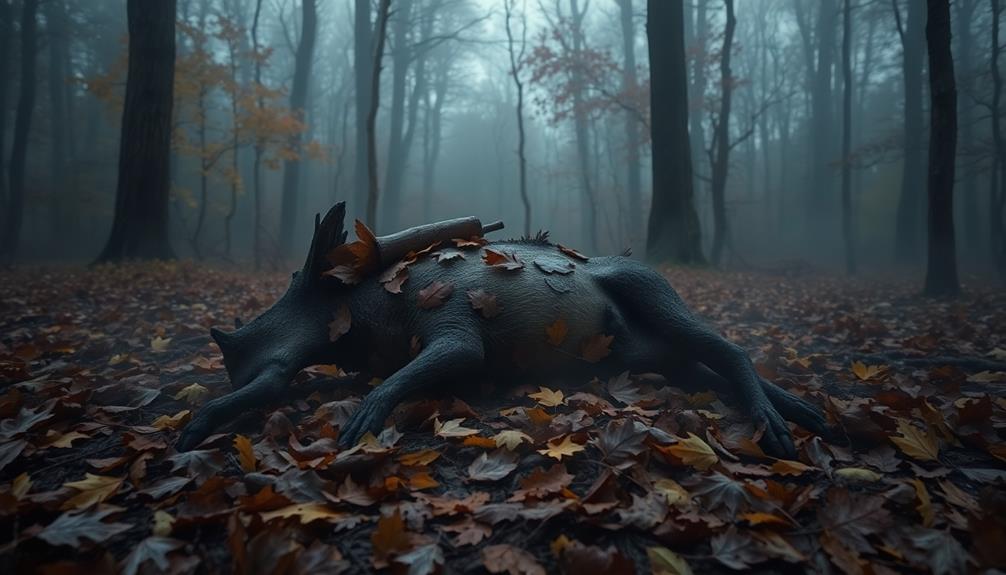
The smell of a dead animal can evoke intense feelings of disgust and revulsion, deeply rooted in cultural perceptions of death and decay. When you encounter this odor, it often reminds you of loss and the finality of life. Many cultures teach that the smell of death is linked to bad omens, stirring up superstitions that can make you feel uneasy.
This smell can trigger strong emotional responses, like anxiety or fear, since it's often associated with disease or contamination. However, in some cultures, the odor of death prompts deeper thoughts about life and our natural cycle. It serves as a reminder that all living things eventually face the end.
Additionally, the distinct smell of a dead animal can symbolize loss and grief, impacting how people express their feelings through art and literature. You might find poems or paintings that explore themes of mortality and the impermanence of life, all inspired by this powerful scent.
Health or Safety Considerations
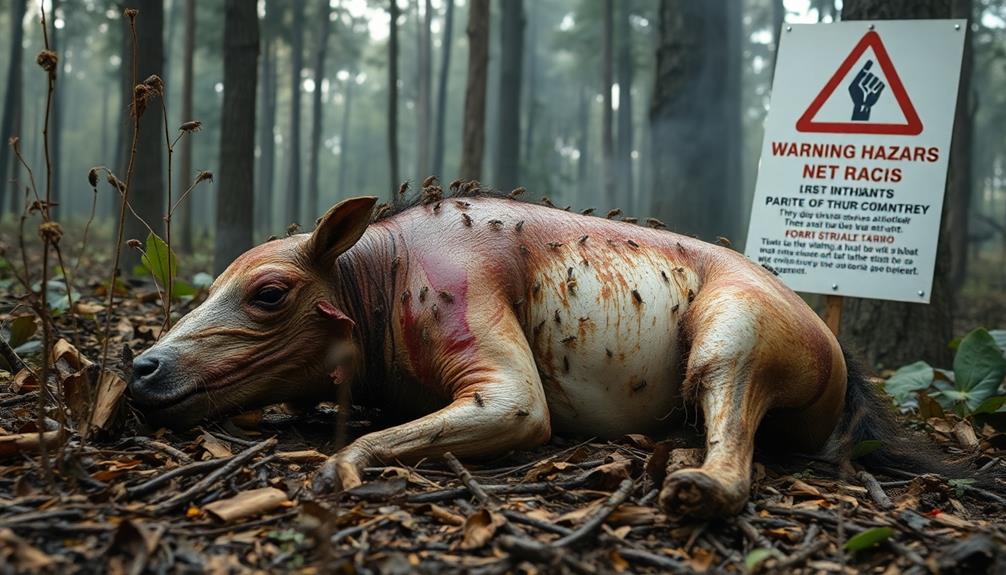
Encountering the smell of a dead animal isn't just an unpleasant experience; it raises important health and safety concerns. The strong odor, like a dead mouse smell, signals that something needs attention.
When animals decompose, they can release harmful bacteria and airborne agents that pose health risks to you and your pets. If you come across a dead animal, it's crucial to wear protective gear like gloves and masks. This keeps you safe from diseases such as hantavirus and leptospirosis that can spread through direct contact.
Ignoring the smell can lead to bigger problems, like scavengers coming around. They can bring more health risks, complicating the situation further.
Also, the surfaces near the dead animals can harbor viruses and bacteria for weeks! You'll need to clean and disinfect those areas thoroughly to ensure safety.
Final Thoughts
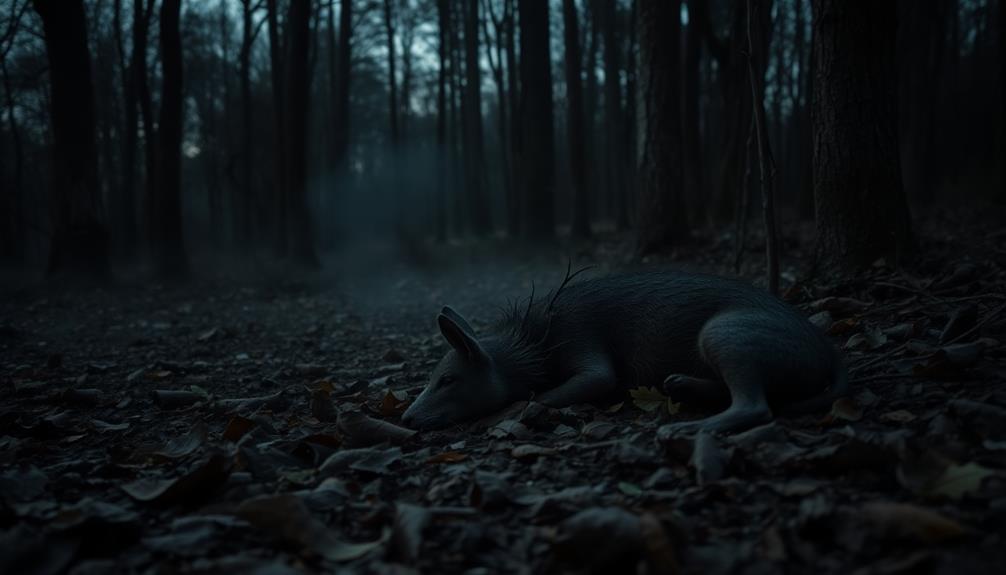
Dealing with the smell of a dead animal can be distressing, but it's essential to act promptly and responsibly. When you encounter that musty, rancid odor, often called the "smell of death," it's a clear sign that something needs to be done.
First, identify the source. Look for signs of decomposition, like increased fly activity or wet spots. Once you find the dead animal, it's time to take action.
You might think about removing it yourself, but it's usually best to call for professional removal. Experts know how to safely and effectively remove the dead while ensuring the area is cleaned thoroughly.
This is important because lingering odors can stick around, even after you remove the dead. A professional can help you rid of the dead and deal with any remaining smells.
Frequently Asked Questions
How Do You Describe the Smell of a Dead Animal?
When you encounter the smell, it hits you like a brick—pungent and nauseating. It's a sharp, musty scent that lingers, intensifying with time, making you instinctively want to escape the area.
What Does Dead Rodent Smell Like?
When you encounter a dead rodent, you'll notice a strong, pungent odor resembling rotting flesh. This scent intensifies as decomposition progresses, often overwhelming in enclosed spaces, making it easier for you to locate the source.
What Smells Like a Dead Animal in a House?
If you notice an overwhelming, unpleasant odor in your house, it might be a dead animal. Check hidden areas, as the smell intensifies near walls or furniture, revealing potential sources of the decay.
How Long Does a Dead Animal Stink?
A dead animal's smell can linger for several days to weeks, depending on environmental factors like temperature and humidity. You'll notice it intensifies as decomposition progresses, especially in damp areas where it might persist longer.
